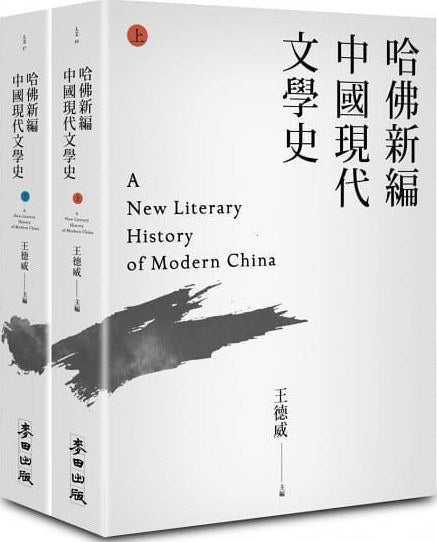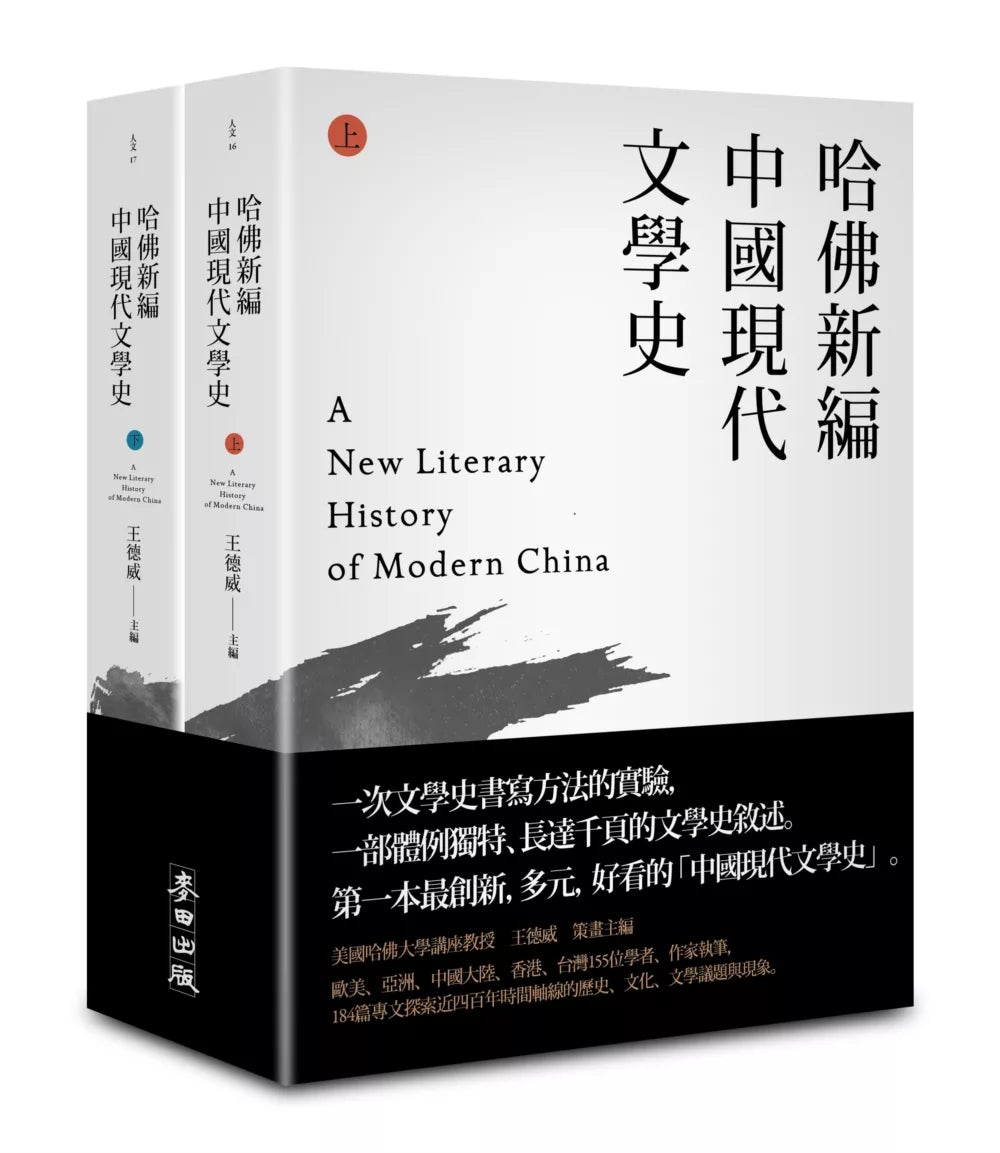1
/
of
2
Harvard's New History of Modern Chinese Literature (Volumes 1 and 2)
Harvard's New History of Modern Chinese Literature (Volumes 1 and 2)
Wang Dewei 王德威等155位作者 译
Regular price
$59.99 USD
Regular price
Sale price
$59.99 USD
Unit price
/
per
Low stock
Couldn't load pickup availability
About Book
About Book
A new literary history of modern China
An experiment in writing literary history.A unique, thousand-page narrative of literary history.
The first, most innovative, diverse, and engaging "History of Modern Chinese Literature."
Curated and edited by Harvard University Professor David Wang, the 184 articles, written by 155 scholars and writers from Europe, America, Asia, mainland China, Hong Kong, and Taiwan, explore historical, cultural, and literary issues and phenomena across nearly four hundred years.
The Harvard New History of Modern Chinese Literature represents a significant breakthrough in English-language scholarship's effort to "rewrite the history of Chinese literature." The volume consists of two volumes: the first, covering "The Multiple Origins of Modern Chinese Literature" from 1635 to Shen Congwen's "From the Mental Asylum to the Museum" in 1949; the second, covering "Time Begins: The Great Leap Forward" from 1949 to "Science Fiction China" in 2066.
/
An experiment in writing literary history.
Following chronological order, it focuses on specific historical moments, events, figures, and propositions, using the small to see the big picture, and makes a scattered and radiating narrative, which is very different from the standardized literary history narrative.
The Harvard New History of Modern Chinese Literature, featuring 155 authors and scholars and 184 articles, forms a unique, thousand-page narrative. The book is presented in chronological order, with individual chapters focusing on specific historical moments, events, figures, and themes, thereby unfolding and articulating the complex landscape of modern literature.
This entire literary history begins with the reinterpretation of "literature" by late Ming scholar Yang Tingyun (1562-1627) and Jesuit priest Giulio Aleni (1582-1649) in 1635, and ends with the contemporary writer Han Song's (1965- ) vision of "Mars shining on America" in 2066. Throughout this "long modern era," Chinese literature has undergone dramatic cultural, political, and religious changes, developing a remarkable richness of content and form. Through this, we hope to present a glimpse into the modernity of Chinese literature to readers worldwide, while also reflecting on the limitations and possibilities of current literary history writing, reading, and teaching.
On the one hand, this book adopts a chronological format, returning to the simple flow of time and events and paying homage to chronicles, one of the sources of traditional Chinese historiography. On the other hand, each essay, focusing on a selected time period or topic, presents a scattered, radiating narrative, capturing the larger picture from a small perspective. The tension created by these two approaches permeates the entire book. The threads—and gaps—formed by these various time points throughout the book invite us to imagine the complex and ever-changing nature of literary history. The attentive reader will discern the subtle threads laid out throughout the book and, drawing inferences from them, continue the story of modern Chinese literature. This literary history does not seek to impose a single opinion, but rather projects a process of dialogue that continues to grow and develop.
The greatest challenge for the editors of this book was to develop a coherent structure that balances the "random" and the "organic," the "missing a few" and the "seeing the big picture from the small," the "one opinion" and the "clamor of many." Throughout the editing process, editor-in-chief David Wang consulted with the various authors on pre-planned themes and their own professional interests. "A New History of Modern Chinese Literature" is a methodological experiment, a creative reflection on the question of "what is literary history" and "what does literary history do."
A dialogue between literature and history.
Breaking the definition of "literature", crossing the boundaries of "modernity", and challenging the reality and illusion of "China".
This book's definition of "literature" departs from a standard definition, and the diverse range of texts and phenomena it encompasses is also captivating. Each essay explores genres, themes, and media with innovative approaches, ranging from late Qing Dynasty pictorials to contemporary online games, from revolutionary enlightenment to birds and butterflies, from speeches by great men to prison letters, from red classics to discrete narratives... Furthermore, each contributor possesses a distinct style. Following an editorial format, each essay unfolds from a specific time, text, object, or event, then "takes its own course." Some incorporate narrative, others draw on personal experience, and even some employ fictional scenarios. This represents a stark departure from the familiar narratives of literary history.
The book may appear chaotic, but beneath the hustle and bustle lies a complex narrative. The issues at stake here extend beyond the scope of literary history to encompass the dialectical relationship between "literature" and "history." For too long, we have been accustomed to a narrow definition of "literature" within the discipline's institutional framework. Dissertations must focus on novels, modern poetry, drama, and prose, while discussions of phenomena often involve various shades of realism, combined with revolutionary enlightenment and a search for the roots of the vanguard. Over time, this has cultivated a narrative voice so familiar it even smacks of stereotyped writing. However, in the 21st century, if the history of modern and contemporary Chinese literature still clings to the norms of the early 20th century, ignoring the evolving dynamics of media, venues, and genres, it would be a form of complacency.
A literary history full of diverse voices.
Take an inclusive approach to the origin and development of modern Chinese-language literature.
The authors of this book hail from mainland China, Taiwan, Hong Kong, Japan, Singapore, Malaysia, Australia, the United States, Canada, the United Kingdom, Germany, the Netherlands, and Sweden. Their interethnic identities, both Chinese and non-Chinese, indirectly illustrate the cacophony of voices. The complexity and interplay of Chinese experiences over the past two centuries are so rich. Only by examining the origins and development of modern Chinese-language literature within an inclusive framework can we gain a broader perspective on the modernity of Chinese literature.
The characters involved in the book are——
From Xu Zhimo, Shen Congwen, Lu Xun, Zhang Ailing; Yu Hua, Mo Yan, Alai, Gu Cheng to Han Han, Mao Pu...
From Lai He, Lu Heruo, Ye Shitao, and Guo Songfen to Pai Hsien-yung, Chen Ying-zhen, Huang Chun-ming, and Qi Bang-yuan;
From Wu He, Zhu Tianwen, Zhu Tianxin, Li Ang, Li Yongping, Zhang Guixing to Xia Yu, Qiu Miaojin, Luo Yijun, Wu Mingyi, Xia Manlan Boan...
From Ang Lee, Tan Zhangke, Tsai Ming-liang, Teresa Teng, Luo Dayou, Cui Jian to Bruce Lee, Mei Lanfang, Sanmao, Jin Yong...
This book explores the genre:
Novels, poetry, commentary, reportage, environmental and ecological literature, left-wing literature, Malaysian Chinese literature; illustrated books, coming-of-age novels, dialect novels, romance, martial arts novels, mystery, science fiction, and fantasy; speeches, epitaphs, Chinese textbooks, online poetry; civilized opera, local opera, Huangmei opera, avant-garde drama, and plays; translation, printing, woodcut art, film, and newspapers...
This book covers events——
The May Fourth Movement, the late Qing Dynasty Reforms, the Taiping Rebellion, the Xinhai Revolution, the Nanjing Massacre, the Anti-Japanese War, the Chinese Civil War, the February 28th Incident, the Great Leap Forward, the Cultural Revolution, and the return of Hong Kong...
The Harvard New History of Modern Chinese Literature employs diverse approaches to the internal and external aspects of the text. The interweaving of the inner and outer, the ancient and the modern, the refined and the vulgar, presents a rich picture of the history of modern Chinese literature.
Publication Date
Publication Date
2021-01-30
Publisher
Publisher
麥田
Imprint
Imprint
Pages
Pages
110
ISBN
ISBN
9789863448730
share



